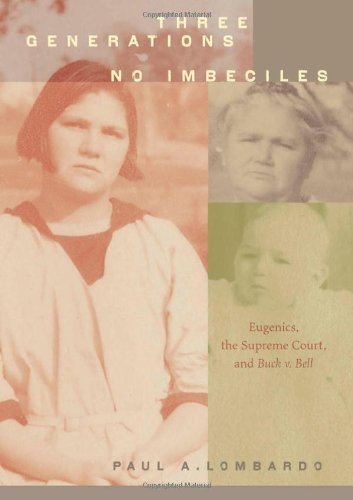
Three Generations, No Imbeciles
Eugenics, the Supreme Court, and Buck v. Bell
اوجنیک، دیوان عالی، و باک در برابر بل
کتاب های مرتبط
- اطلاعات
- نقد و بررسی
- دیدگاه کاربران
نقد و بررسی

Starred review from August 25, 2008
Law professor and historian Lombardo does a superb job of revealing, for the first time, all the facts in the infamous Buck
v. Bell
case of the 1920s, the Supreme Court decision ratifying Virginia’s compulsory sterilization of “feebleminded” people. In the majority decision, Chief Justice Oliver Wendell Holmes Jr. called the plaintiffs “manifestly unfit” both mentally and morally, and insisted that “three generations of imbeciles are enough.” This decision—which has never been overturned—led to tens of thousands of involuntary sterilizations. Lombardo interviewed the last survivor of the three Buck women who were plaintiffs; turned up indisputable evidence that there was no feeblemindedness in that family; unearthed previously unknown correspondence of Carrie Buck’s attorney, who, believing the law to be necessary, mounted a deliberately insufficient defense; and documented the private family tragedy (an incestuous rape and resulting pregnancy) that lay behind the Bucks’ encounter with doctors bent on exploring eugenics. His book is a testament to injustice and to ignorance—not that of the Buck women, but rather of powerful doctors, attorneys and Supreme Court justices. 17 b&w photos.

October 1, 2008
Lombardo (law, Georgia State Univ.) traces a seminal 1927 Supreme Court case arising from the attempt by authorities in Virginia to force the sterilization of a woman believed to be mentally and socially "insufficient." Lombardo carefully re-creates the trial, which resulted in a ruling formally endorsing the sterilization of Carrie Buck. The case quickly advanced to the U.S. Supreme Court, where the justices ruled that the sterilization law did not violate the Eighth Amendment. Lombardo minces no words in expressing his disdain for the lackluster performance and conflicts of interest of Buck's attorney. Carrie's fate before the Court, argues the author, was partially attributable to social Darwinism as well as the attitude of the Court's chief social arbiter, Oliver Wendell Holmes Jr., that society should not bear the burden of people born without pedigree, status, intelligence, or capacity. Lombardo observes that by the early 1970s medical science had strongly discredited the notion that bad heredity could be interrupted by sterilization, and the entire movement ground to a screeching halt. This original study is highly recommended for academic, public, and law libraries.Philip Y. Blue, New York State Supreme Court Criminal Branch Law Lib., First Judicial Dist.
Copyright 2008 Library Journal, LLC Used with permission.

October 15, 2008
A 1927 U.S. Supreme Court ruling, Buck v. Bell, approved laws allowing states to sterilize the feebleminded to keep them from having children. The case involved Carrie Buck, whose mother and daughterlike Carriehad been adjudged feebleminded. At a time of growing debate about the practice of eugenics, feebleminded was a label freely and frequently given to prostitutes, illegitimate children, andepileptics, as well asthe mentally deficient. For a period, Carrie and her mother were both residents of the Colony, a facility that practiced the segregation and sterilization policies prevalent at the time. Supreme Court Justice Oliver Wendell Holmes Jr., in writing the decision, declared that three generations of imbeciles are enough. The decision set in motion more than 60,000 sterilizations. Law professor Lombardo draws on 25 years of research, including interviews with Buck before she died, her medical and school records, correspondence with her attorneys, and other documents to support the claim that the case was a fraud against a poor girl who had been raped. An engrossing look at a shameful case.(Reprinted with permission of Booklist, copyright 2008, American Library Association.)

























دیدگاه کاربران